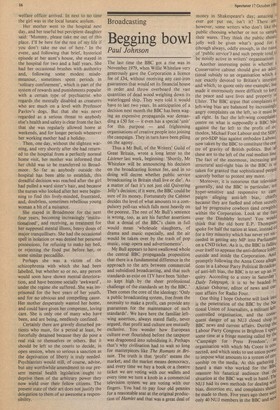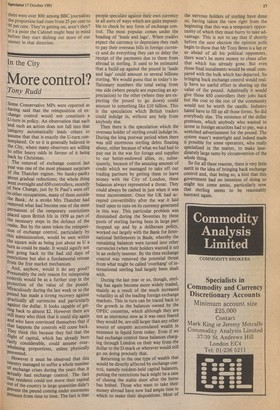Broadcasting
Begging bowl
Paul Johnson
The last time the BBC got a rise was in November 1979, when Willie Whitelaw very generously gave the Corporation a licence fee of £34, without receiving any cast-iron guarantees that would set its financial house in order and throw overboard the vast quantities of dead wood weighing down its waterlogged ship. They were told it would have to last two years. In anticipation of a decision next month the BBC has been waging an expensive propaganda war demanding a £50 fee — it even has a special 'unit' for this purpose — and frightening organisations of creative people into joining the campaign. They in turn have been piling on the agony.
Thus a Mr Bull, of the Writers' Guild of Great Britain, wrote a long letter to the Listener last week, beginning: 'Shortly, Mr Whitelaw will be announcing his decision on the broadcasting licence fee, and in so • doing will decree whether public service broadcasting in Britain shall live or die'. As a matter of fact it's not just old Quivering Jelly's decision; if it were, the BBC could be sure of its money. Fortunately the Cabinet decides the level of what amounts to a compulsory poll-tax which falls most heavily on the poorest. The rest of Mr Bull's sentence is wrong, too, as are his further assertions that a denial of the BBC's claim in full would mean 'wholesale slaughters, of drama and music especially, and the air would be taken over by the trash of pop music, soap opera and advertisements'.
Mr Bull appears to have swallowed whole the central BBC propaganda proposition that there is a fundamental difference in the approach to the arts between commercial and subsidised broadcasting, and that such standards as exist on ITV have been 'hitherto kept high by the sheer professional challenge of the standards set by the BBC.' Then comes the core of the ideology: 'Only a public broadcasting system, free from the necessity to make a profit, can provide any guarantees for the maintenance of such standards'. We have here the familiar leftwing assertion, always stated flatly, never argued, that profit and culture are mutually exclusive. You wonder how European culture ever flourished before the taxpayer was dragooned into subsidising it. Perhaps that's why civilisation had to wait so long for masterpieces like The Romans in Britain. The truth is that 'profit' means the market, and the market means democracy, and every time we buy a book or a theatre ticket we are voting with our wallets and every time we turn a knob in a commercial television system we are voting with our fingers. You had to pay four old pennies for a reasonable seat at the original production of Hamlet and that was a great deal of money in Shakespeare's day; amazing ever got put on, isn't it? There are however, some writers who don't like th( public choosing whether or not to samPI( their wares. They think the public should jolly well be given what's good for (though always, oddly enough, in the name of 'public service') and such people tend te be noisily active in writers' organisations.
Another interesting point is whether a Conservative cabinet should give an addl. tional subsidy to an organisation which Is not exactly devoted to Britain's interests and which, to quote only one example, has made it enormously more difficult to keeP the peace and save lives and property In Ulster. The BBC argue that complaints of left-wing bias are balanced by increasinglY angry complaints on the left, so it must be all right. In fact the left-wing complaints centre on what is supposedly a BBC bias against the far left to the profit of or' thodox, Michael Foot Labour and the SDP, or pro-SDP bias against orthodox Labour, now taken by the BBC to constitute the centre of gravity of British politics. But all these are to the left of the real median line. The fact of the enormous, increasing arid structural anti-right bias in the BBC is so taken for granted that sophisticated people scarcely bother to protest any more.
Moreover, it is notorious that television generally, and the BBC in particular, are hyper-sensitive and responsive to calm paigns alleging anti-left bias, chieflY because they are fuelled and often secret' led by progressive cowboys (and cowgirls) within the Corporation. Look at the fuss over the Dimbleby lecture! You would think that the old bore E.P. Thompson, spoke for half the nation at least, instead 01 for a tiny minority which has never yet suc' ceeded in getting any MP into Parliament on a CND ticket. As it is, the BBC is falline over itself to appease the anti-defence lobh! outside and inside the Corporation. And promptly following the Anna Coote allega tions in a Labour Party Political Broadeas of anti-left bias, the BBC is to set up an In, quiry. According to a story in Saturday Daily Telegraph, it is to be headed b) Alistair Osborne, editor of news and cur' rent affairs for Radio Four.
One thing I hope Osborne will look int° is the penetration of the BBC by the tional Union of Journalists, a militant left" controlled organisation, and the cons.e" quent danger of an NUJ closed shoP BBC news and current affairs. During the Labour Party Congress in Brighton I spell' some time at a fringe meeting called by the 'Campaign for Press Freedom', an organisation with which Ms Coote is con' nected, and which seeks to use union povVer to impose what amounts to a system a cen, sorship on the media. At this gathering c` heard a man who worked for the 1313 reassure his fanatical audience that situation at the BBC was well in hand. 1".11118 NUJ had its own methods for dealing wit" bias, distortion etc, and complaints shouwe be made to them. Five years ago there Or, only 40 NUJ members in the BBC and 110" there were over 300; among BBC journalists the proportion had risen from 25 per cent to 95 per cent. They're getting on, aren't they? It's a point the Cabinet might bear in mind before they start dishing out more of our money in that direction.







































 Previous page
Previous page